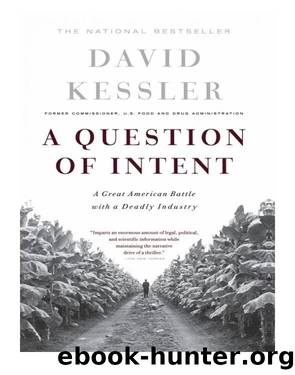A Question of Intent by David Kessler

Author:David Kessler
Language: eng
Format: epub
Publisher: PublicAffairs
Published: 2011-02-14T16:00:00+00:00
WITHIN a few days we struck a deal with Waxman’s office and agreed to sift through the documents to help them identify those of special importance. In exchange, we were allowed to take extensive notes, but not to make any copies of the material. Ann Witt and Mitch Zeller headed to the Gerald R. Ford House Annex. Years before, the Annex had been an apartment building for congressmen, with a room on the fifth floor reserved for poker games between the nation’s elected representatives and its lobbyists. The offices were overcrowded, and the building was dingy and in such disrepair that staffers were told not to overload their bookshelves or to fill more than three drawers of their file cabinets, lest the floor collapse under the weight.
At the Annex, stacks of manila folders had been piled into boxes in random fashion, with no clear beginning or end. Ann and Mitch each took a box, picked up the first document, and started to read. Although the papers were largely summaries and indexes that served as a road map to other documents, they quickly grew excited. Their words of astonishment kept breaking the silence.
The papers were filled with references to research, primarily from the 1960s and 1970s, involving nicotine, nicotine manipulation, and the biological activity of tobacco. An internal memo suggested that the company planned to protect many of the documents from legal discovery by asserting claims of attorney-client privilege. Ann was struck by the blunt tone of the documents, a stark contrast to how the tobacco companies had been dealing with us. It was as if we had suddenly been shot into the inner workings of the industry. In short order, Mitch and Ann had taken some fifty pages of handwritten notes. Impatient for details, I raced between meetings to a nearby coffee shop and insisted they interrupt their work to join me and tell me what they had found.
Once they had a more complete feel for the documents, we gathered for a closed meeting in my office. Ann read me notes taken from the glossary of terms developed to guide Merrell Williams and his paralegal colleagues as they reviewed and coded the documents, presumably in preparation for litigation. “Confirmation of causation” was the label assigned to documents that confirmed the link between smoking and disease while the phrase “manipulation of research/data” was used for documents “suggesting that cigarette companies made recommendations to research organizations about how research should be performed....” I also noticed that “industry competition” was the code for documents that suggested the company might be trying to get a competitive edge by, for example, designing products that allow a smoker to “adjust his smoking habits (e.g., compensate) to obtain greater delivery of nicotine.”
Documents pertaining to the industry’s advertising and marketing strategies were also coded, on the basis of their targeted audiences: “smokers 18 years of age or younger,” “persons who have not yet started smoking,” and “individuals attempting to quit....” Then there was a list of reports with
Download
This site does not store any files on its server. We only index and link to content provided by other sites. Please contact the content providers to delete copyright contents if any and email us, we'll remove relevant links or contents immediately.
The Secret History by Donna Tartt(18058)
The Social Justice Warrior Handbook by Lisa De Pasquale(11930)
Thirteen Reasons Why by Jay Asher(8399)
This Is How You Lose Her by Junot Diaz(6401)
Weapons of Math Destruction by Cathy O'Neil(5779)
Zero to One by Peter Thiel(5444)
Beartown by Fredrik Backman(5293)
The Myth of the Strong Leader by Archie Brown(5204)
The Fire Next Time by James Baldwin(4987)
How Democracies Die by Steven Levitsky & Daniel Ziblatt(4933)
Promise Me, Dad by Joe Biden(4890)
Stone's Rules by Roger Stone(4819)
100 Deadly Skills by Clint Emerson(4647)
Rise and Kill First by Ronen Bergman(4528)
A Higher Loyalty: Truth, Lies, and Leadership by James Comey(4520)
The David Icke Guide to the Global Conspiracy (and how to end it) by David Icke(4348)
Secrecy World by Jake Bernstein(4342)
The Farm by Tom Rob Smith(4294)
The Doomsday Machine by Daniel Ellsberg(4221)
